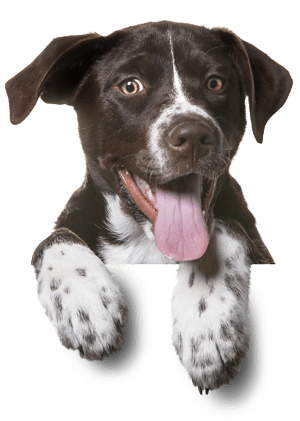Kennel cough is a term loosely used to describe a complex of respiratory infections—both viral and bacterial—that causes inflammation of a dog’s voice box and windpipe. It’s a form of bronchitis and is similar to a chest cold in humans.
Kennel Cough
Symptoms of Kennel Cough
- A persistent dry cough with a “honking” sound.
- In most cases, she’ll appear healthy except for the cough.
- Gagging
- Coughing up white foamy phlegm
- Fever
- Nasal discharge
Causes of Kennel Cough
- Kennel cough can spread through aerosols in the air, directly from dog to dog, or through germs on contaminated objects.
- Kennel cough is often spread in enclosed areas with poor air circulation, like a kennel or an animal shelter.
- Kennel cough can also spread through direct contact like shared water dishes or even greeting another dog
- Most kennels will not board a pet without proof of a recent vaccination against parainfluenza and Bordetella, two of the main causes of kennel cough.
Dogs More Prone to Kennel Cough
- Kennel cough can spread through aerosols in the air, directly from dog to dog, or through germs on contaminated objects.
- Kennel cough is often spread in enclosed areas with poor air circulation, like a kennel or an animal shelter.
- Kennel cough can also spread through direct contact like shared water dishes or even greeting another dog.
Kennel Cough Prevention
- The best way to prevent kennel cough is to prevent exposure.
- Vaccinations are also available for several of the agents known to be involved in kennel cough, including parainfluenza, Bordetella and adenovirus-2.
- Ask your vet if these are recommended, and how often.
- Vaccinations aren’t useful if a dog has already caught the virus.
Kennel Cough Treatment
See your veterinarian if your dog develops a cough. In some cases, you may be advised to simply let kennel cough run its course and heed the following:
- Dogs with kennel cough should be isolated from other dogs.
- A humidifier, vaporizer or steam from a shower can provide relief for irritated breathing passages.
- Avoid exposing your dog to cigarette smoke or other noxious, irritating fumes.
- A cough suppressant or antimicrobial may be prescribed.
- If your dog pulls against her collar while being walked, replace it with a harness until the coughing subsides.
- Supportive care is very important—be sure your dog is eating, drinking and in a stress-free environment.


